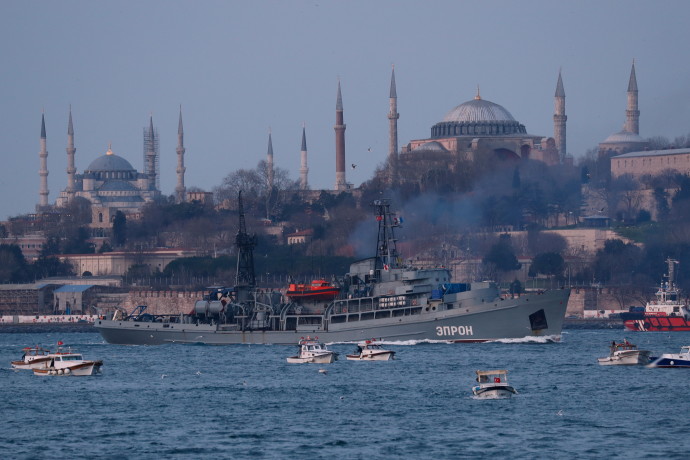Russia on Friday expelled 18 European Union diplomats in retaliation for Brussels' decision to declare 19 Russians personae non-gratae earlier this month.
The EU on April 5 said the 19 Russian diplomats had been "engaging in activities contrary to their diplomatic status" and ordered them to leave Belgium.
Russia's foreign ministry said in its statement that it had summoned EU ambassador to Russia, Markus Ederer, and handed him a note of protest.
"The Russian side declared that the EU is responsible for the consistent destruction of the architecture of bilateral dialog and cooperation that had taken decades to form," it said.
The EU diplomats must leave Russia as soon as possible, the ministry added.
The EU mission to Russia said in a statement it regretted what it called an unfounded move.
"The decision of the Russian authorities announced on Friday has no grounds and is nothing else than a retaliatory step," it said in a statement on Telegram.
"Russia's chosen course of action will further increase its international isolation," the EU mission added.
In addition, Russia's foreign ministry said on Saturday it had barred entry to the country for British Prime Minister Boris Johnson, Foreign Secretary Liz Truss, Defence Secretary Ben Wallace and 10 other British government members and politicians.
The move was taken "in view of the unprecedented hostile action by the British Government, in particular the imposition of sanctions against senior Russian officials," the ministry said in a statement, adding that it would expand the list soon.
The Kremlin has described Johnson, who has been one of Ukraine's staunchest backers, as "the most active participant in the race to be anti-Russian."
A week ago, Johnson visited Kyiv where he and Ukrainian President Volodymyr Zelensky praised each other for their cooperation since the Russian invasion, which Moscow calls a "special operation."
ZELENSKY ASKS BIDEN TO LIST RUSSIA AS STATE TERRORISM SPONSOR
Ukrainian President Volodymyr Zelensky recently made a direct appeal to US President Joe Biden for the United States to designate Russia a "state sponsor of terrorism," The Washington Post reported on Friday, citing people familiar with their conversation.
Biden did not commit to specific actions during that call, the newspaper reported.
US AND NATO WEAPONS SHIPMENTS
Shipments of security assistance packages from the US to Ukraine “have begun arriving,” a White House official told CNN Saturday.
Russia has warned the United States that there will be "unpredictable consequences" if Washington keeps arming Ukraine, The Washington Post reported on Friday.
In Moscow, a foreign ministry spokeswoman confirmed Russia had sent diplomatic notes to the United States and other nations about supplying weapons to Ukraine but did not say what the messages contained, Interfax news agency reported.
"We call on the United States and its allies to stop the irresponsible militarization of Ukraine, which implies unpredictable consequences for regional and international security," the Post quoted Russia saying in a note to the United States.
POLISH MERCENARIES
Polish Ambassador to Ukraine Bartosz Cichotski commented on Russia's statements about the alleged destruction of "30 Polish mercenaries."
"Russia also says there was a storm in the Black Sea," he wrote on Twitter, quoting AFP reports that Russia had killed up to 30 "Polish mercenaries" in Ukraine.
The Russian Ministry of Defense said that the strategic missile unit "killed up to 30 Polish mercenaries" during the attack on the village of Izyumskoye near Kharkiv.

The ambassador made an ironic allusion to previous statements by the Russian Defense Ministry regarding the sinking of the cruiser "Moscow" — Russia claimed that the cruiser sank while being towed in a storm.
OIL EMBARGO
An oil embargo may be imposed by the EU against Russia after the presidential run-off in France to avoid helping far-right candidate Marine Le Pen, who has railed against rising fuel prices, the New York Times reported.
Until now, the oil embargo has not been seen as an option due to the strong dependence of countries such as Germany and Hungary, for whom the blocking of Russian raw materials could disrupt policy in the region and raise energy prices.
The latest EU sanctions package has managed to agree on a coal embargo, which will take effect in August 2022. At the time, top EU officials hinted that oil sanctions were already being worked out and included in the next, sixth, package. The oil embargo will have a similar principle and will give countries a temporary "buffer" to find new suppliers.
Interlocutors of the publication note that the EU is no longer waiting for a trigger to strengthen sanctions against Russia in the issue of sanctions, but such an event could speed up approval.
